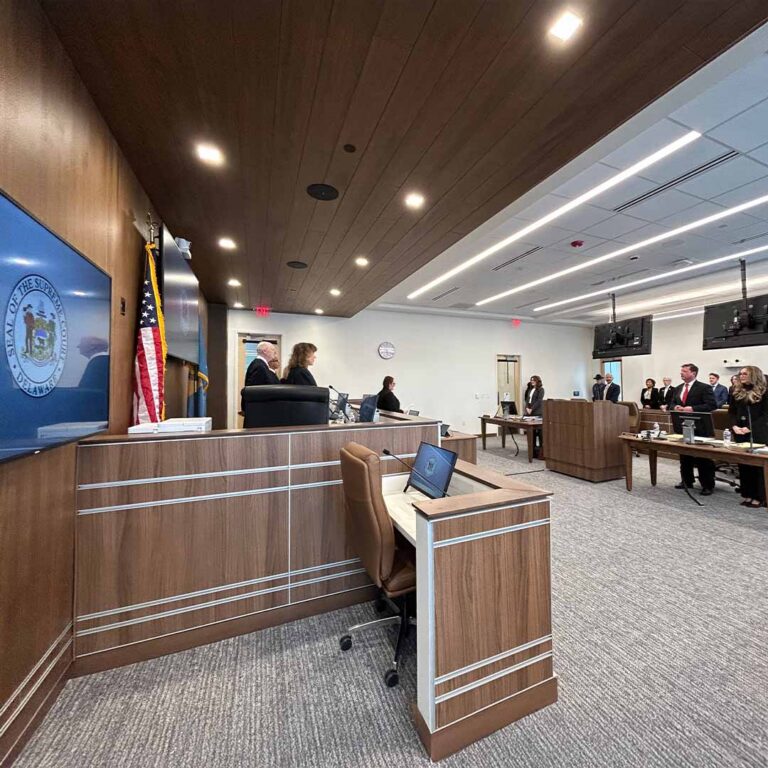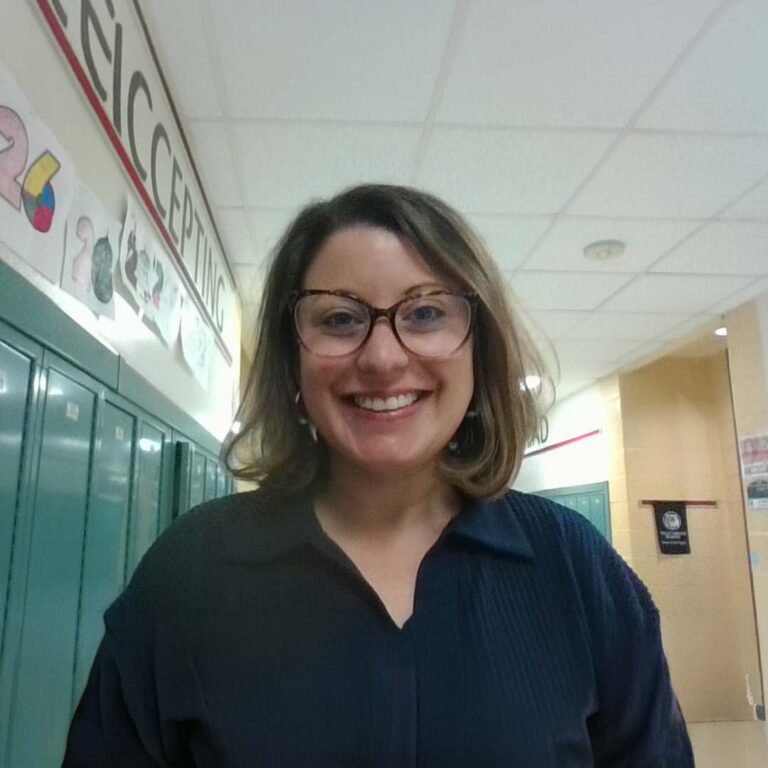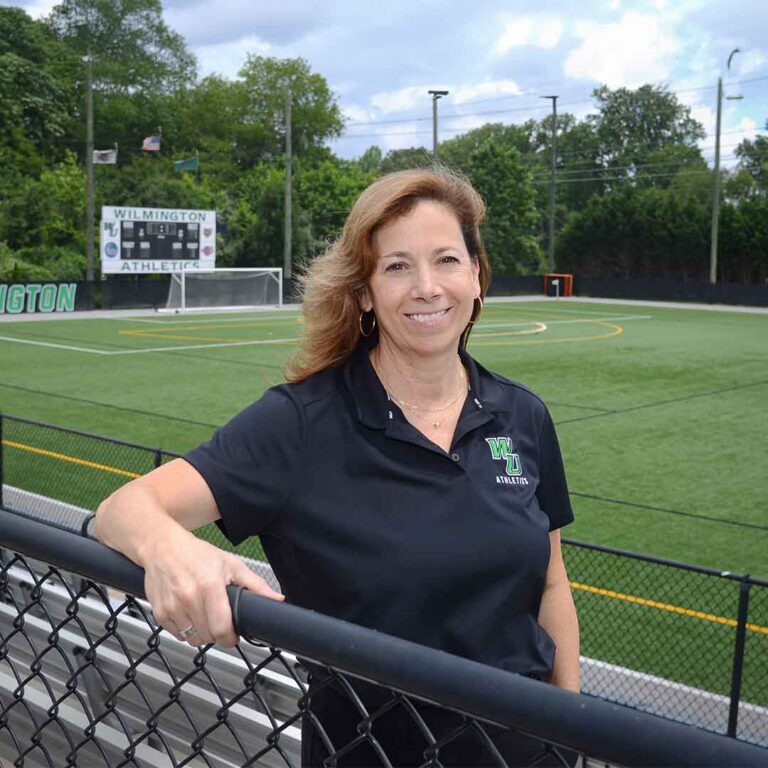With Hope, Optimism and Confidence

Recent graduate Jessica Davenport refuses to let her disability impact her success.
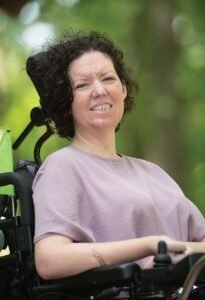
Jessica Davenport thinks that society undervalues people with disabilities, and she’s trying to change that. “Unfortunately,” she says, “we have to constantly prove society wrong.”
At 19, Davenport suffered a massive stroke from a combination of birth control pills, smoking, a clotting disorder, and a hole in her heart. As a result, she suffers from paraplegia and has extremely limited use of her body. She is in a wheelchair and is unable to talk.
Despite her disability, Davenport recently earned her B.S. in Health Sciences at WilmU, and will accept her diploma in June. During her college years, she published a book and interned with the Delaware Department of Health and Social Services (DHSS) in its Division of Developmental Disabilities Services (DDDS). The state allowed her to work with a team to help develop a curriculum for a Direct Support Professional Academy in Delaware — the first in the state — in partnership with RCM of Washington, Inc. The company has already developed similar academies in Washington, D.C., Tennessee and Ohio.
“This was actually my second internship with Wilmington University,” says Davenport, who replies via her speech-generating device. (Her first internship was at Resources for Independent Living, Inc., which provides services to individuals with severe disabilities, including unserved and underserved populations.) “I hadn’t worked for many years and wanted to get the most experience possible. Honestly, when DDDS contacted me, I cried. I was so excited. I joked with my boyfriend, ‘They must really be desperate,’ and he said, ‘No, they see potential.’”

Dr. Angela Herman, WilmU’s chair of Health Sciences in the College of Health Professions and Natural Sciences, saw the same potential. “Jessica was very motivated and never let her disability define her at all,” she says.
To which Davenport replies, “I say that about myself, but it feels good knowing that somebody else sees it.”
Davenport’s 2018 book, “Detoured Destiny, One Woman’s Road to Recovery,” chronicles her physical challenges, bouts of self-doubt, and triumphs. But that’s just one tool in her advocacy arsenal. She’s a champion for people with disabilities and is committed to helping women learn more about birth control to avoid an issue that nearly killed her.
“Jessica was very motivated and never let her disability define her at all.”
— Dr. Angela Herman
“I wrote it because I didn’t want anyone to go through what I did,” she says, suspecting that while several factors contributed to her stroke, many women don’t realize the dangers of smoking while on birth control.
Jefferson Health’s website reports that “blood vessels in smokers can become hard and restricted. Oral contraceptives also affect blood flow as they alter hormone levels. That change in the body’s hormonal makeup thickens the blood and can cause blood clots in the legs, lungs, and veins of the brain. The combination of restricted blood vessels from smoking and thicker blood from birth control increases the risk of cardiovascular issues like strokes or heart attacks.”
The stroke devastated Davenport, forcing her to question everything she knew about life — and where hers was headed. That is until she met a woman with a brain injury who had found a job working with other people with disabilities.
“I remember telling my mom how cool that was,” says Davenport. “This woman wasn’t letting anyone tell her she couldn’t do something. I knew disabled people could work, but I hadn’t seen stroke survivors work. I didn’t grow up around many people with disabilities and didn’t become disabled until 19, so meeting her was truly inspiring. ”
Then came college, a challenging venture for those who are able-bodied and often arduous for those who aren’t. “Going back to school after a disability is extremely hard,” says Davenport. “The first few classes I took, I cried to everybody around me, saying, ‘I can’t do this.’”
Assignments that some students did with relative ease were complex for her. “When I hear able-bodied people complain about writing papers or doing homework, I chuckle and think, ‘Really? Try writing a three-page paper in APA format in a week the way I do.’”
Davenport used a headpiece and a magnetic sticker, which nurses placed on her nose. The sticker communicated with Davenport’s iPad. That served as her speaking mechanism and enabled her to spell out words. Speech-generating devices like this address the needs of stroke victims, assisting them in communicating thoughts by electronic voice generation.
“I honestly cannot imagine how she did all the papers this program requires,” says Dr. Herman, “but it was inspirational to see just the same.”
It’s unclear whether writing in APA (American Psychological Association) format was more challenging because of her disability. Davenport is not alone in her ambivalence toward APA. It’s simply a writing style that college students must learn. And like writing in general, some become proficient while others struggle.
According to the Stroke Foundation, one in three stroke survivors experience communication struggles. Memory, thinking and judgment are affected, and it can be hard to understand or speak complex sentences.
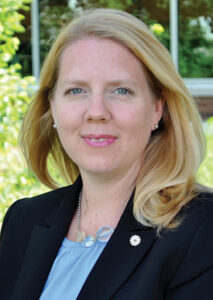
Davenport thrived, nonetheless. “She has so much perseverance and gumption,” says Christyn Rudolf, who manages WilmU’s Office of Student Accessibility Services. “Jessica found a way to educate herself. She found a way to share her story. She found a way to be an advocate. She found her independence.”
And, Rudolf adds, Davenport is a member of Delta Alpha Pi, an international honor society established to distinguish students who have attained superior academic records while managing personal setbacks.
Davenport’s academic success inspired her WilmU faculty, all of whom created an inclusive environment in which all students could succeed. That included Dr. Herman, who had brainstormed several other prospective roles with Davenport before she landed the DHSS internship.
“Jessica found a way to educate herself. She found a way to share her story. She found a way to be an advocate. She found her independence.”
— Christyn Rudolf
“The opportunities for people with disabilities are always increasing in health care,” says Dr. Herman. “There is such a great need for so many hands to help others that we are finding ways to share the workload that did not exist in the past. For example, consider all the virtual health care that’s available now. Someone with a physical disability could work from home easily as a patient navigator or virtual tech assistant. The opportunities are less, of course, but I think diligent students like Jessica, partnered with universities that are truly committed to helping them achieve their career goals, can ideally be effective in working together to find jobs for them.”
Davenport had searched for a university that provided individual attention. “My experience was great, and the faculty cared that you learned and earned good grades. I always recommend WilmU to friends,” she says, adding that the Office of Student Accessibility Services was incredible.
“I can’t think of anyone I know who has overcome so much to reach her goals and dreams,” says Rudolf. “And she does it all with such positive energy and a smile on her face. It makes my heart sing that Jessica has gotten to the place she has.”
Getting On With It Davenport chose self-care instead of self-pity. She has her degree. She just wants to get on with it.
“Jessica has been invited for a second internship at DHSS to continue helping with the DSP Academy project, which is very exciting for Delaware,” says Dr. Herman. “She can also gain exposure to other business units within the state. We are all so proud of her.”
As is C. Renée Settles-Bean, Davenport’s site supervisor at DHSS. “Had we been speaking about this 20 years ago, when technology wasn’t as advanced, it may have been a different story,” she says. “But given modern accommodations, along with who Jessica is as a person, her mind, humanities acumen, and values, I believe she can do anything she wants.”
“My experience was great, and the faculty cared that you learned and earned good grades. I always recommend WilmU to friends.”
— Jessica Davenport
If Davenport wants to support people with disabilities and help them find their voices, she can do that, too, adds Settles-Bean. “If we are to embrace an inclusive workspace, then absolutely she has what it takes to succeed. She has options, as we all do; it’s just that her approach will be different.”
American author and educator Helen Keller, who was blind and deaf, dedicated her life to advocating for the rights of people with disabilities. She said, “Optimism is the faith that leads to achievement. Nothing can be done without hope and confidence.”
Davenport has both. It’s about the message: Challenges can stop you or inspire you. In 10 years, she says, “I want to be completely experienced in a career that has been a dream for years.”
Given her tenacity, it’s more than a dream. It’s a viable future.
— Maria Hess
